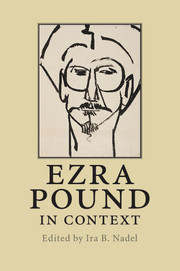Book contents
- Frontmatter
- Contents
- Notes on contributors
- Acknowledgements
- Chronology
- List of abbreviations and note on references to The Cantos
- Introduction
- Part I Biography and works
- Part II Historical and cultural context
- 16 The classics
- 17 Provençal and the troubadours
- 18 Dante and early Italian poetry
- 19 America
- 20 Venice
- 21 London
- 22 Paris
- 23 Rapallo and Rome
- 24 Pisa
- 25 Imagism
- 26 Vorticism
- 27 Music
- 28 Visual arts
- 29 Confucius
- 30 The Orient
- 31 Little magazines
- 32 Publishing and publishers
- 33 Modernism
- 34 Fascism
- 35 Anti-Semitism
- 36 Gender and sexuality
- 37 Race
- 38 Travel
- Part III Critical reception
- Further reading
- Index
18 - Dante and early Italian poetry
Published online by Cambridge University Press: 05 July 2014
- Frontmatter
- Contents
- Notes on contributors
- Acknowledgements
- Chronology
- List of abbreviations and note on references to The Cantos
- Introduction
- Part I Biography and works
- Part II Historical and cultural context
- 16 The classics
- 17 Provençal and the troubadours
- 18 Dante and early Italian poetry
- 19 America
- 20 Venice
- 21 London
- 22 Paris
- 23 Rapallo and Rome
- 24 Pisa
- 25 Imagism
- 26 Vorticism
- 27 Music
- 28 Visual arts
- 29 Confucius
- 30 The Orient
- 31 Little magazines
- 32 Publishing and publishers
- 33 Modernism
- 34 Fascism
- 35 Anti-Semitism
- 36 Gender and sexuality
- 37 Race
- 38 Travel
- Part III Critical reception
- Further reading
- Index
Summary
POUND'S MEDIEVALISM
Pound first read Dante in 1904 as an undergraduate at Hamilton College in upstate New York. His Dante instructor, Professor William Shepard, “Shep,” admired Pound's seriousness as a student of languages. Pound's study of Dante continued for another sixty-eight years, until his death in 1972.
He continued to study Dante in 1904, following Shepard's lectures in medieval poetry, with a great deal of excitement. Pound's principal literary correspondent during that time was his mother, and whatever parental conflict he experienced as a teenager was with her. The United States had manifested considerable anti-Catholic sentiment from before its founding, and that prejudice was reinforced by the waves of Italian Catholic immigrants who were arriving on its shores, many of them living in tenements in South Philadelphia. Pound's parents, Homer and Isabel, who lived in a Philadelphia suburb, volunteered as missionaries in those slums, trying to convert the Italians to their Presbyterian version of Christianity.
Of course there was an American Dante movement in New England centered on Boston. Longfellow was the first instructor of Dante at Harvard, starting in 1836, and there was a kind of Dante club or cult in Boston in the latter part of the nineteenth century. America needed an epic and perhaps Dante might do. He had denounced the corruption of the Catholic Church and clergy.
- Type
- Chapter
- Information
- Ezra Pound in Context , pp. 192 - 201Publisher: Cambridge University PressPrint publication year: 2010



